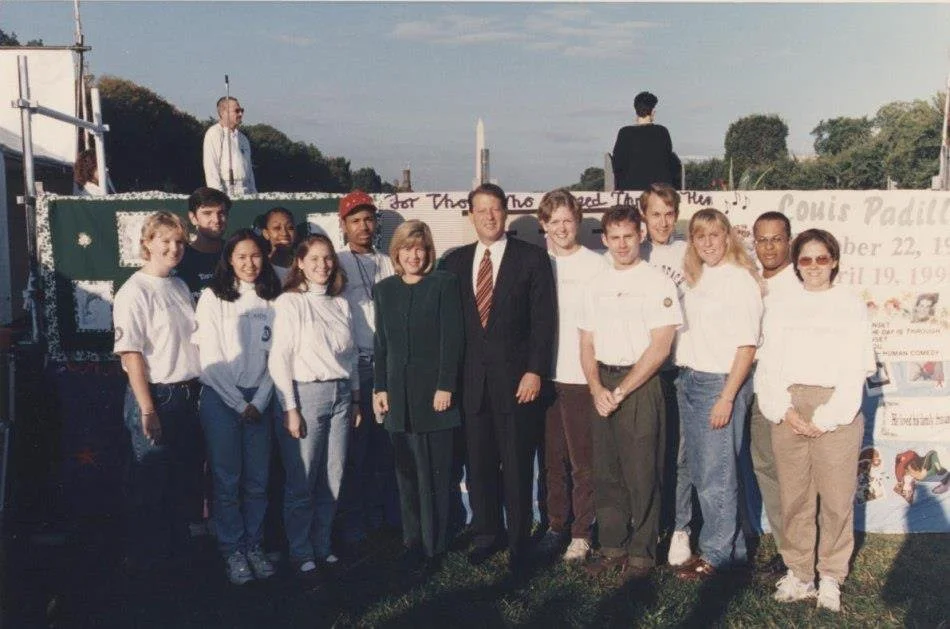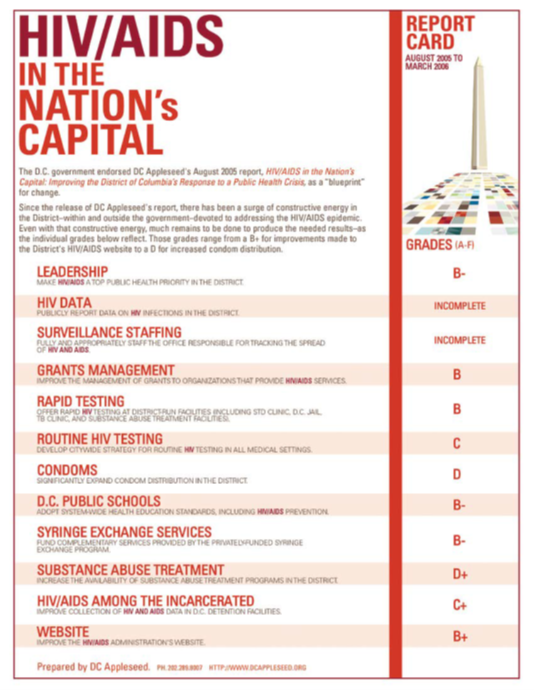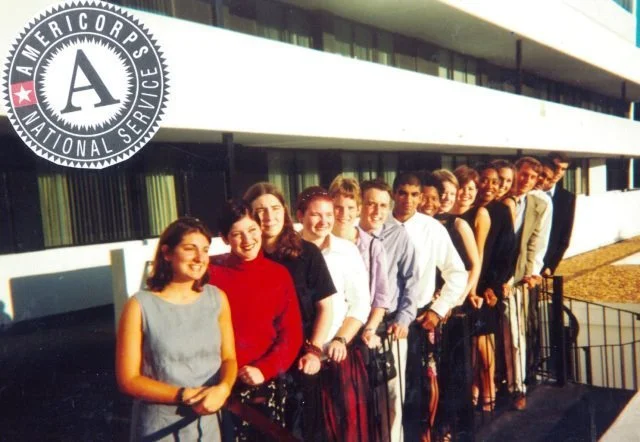Washington AIDS Partnership Celebrates 35 Years of Philanthropic Impact in DC
Americorps Volunteers with the Washington AIDS Partnership pose with VP Al Gore and his wife at the unveiling of the AIDS Memorial Quilt on the National Mall (1996)
One of the most successful philanthropic partnerships in our region’s history celebrated its final milestone last month, as the Washington AIDS Partnership closed its doors for the last time. Over the past 35 years, the Partnership distributed more than $35 million to 129 different organizations across DC.
“The work to address HIV and AIDS is not over,” the Partnership’s long-time Executive Director Channing Wickham shared. “Yet the Washington AIDS Partnership’s role in the fight to end the local epidemic is coming to a close.”
Channing Wickham, Executive Director of the Washington AIDS Partnership
“We are proud to have helped change how HIV and AIDS treatment and care are delivered in our region.”
“Philanthropy’s job is to identify problems and fund solutions,” Kathy Whelpley, former chair of the Washington AIDS Partnership Steering Committee added. “But best practices is to acknowledge when progress has been achieved and when there is more urgent need for those philanthropic dollars.”
The Washington AIDS Partnership was founded by a group of 20 philanthropic foundations -- including The Community Foundation, the Ford Foundation, the Meyer Foundation, and others -- who came together to fund a response to an urgent public health crisis – the HIV/AIDS pandemic.
In 1988, the Washington, DC region had the fifth-highest infection rate of HIV/AIDS in the nation. To date, the HIV/AIDS epidemic has claimed more than 700,000 lives nationwide. At the time, there was no real infrastructure to address HIV or AIDS – which had no known treatment or cure and was often fatal to those who contracted the disease.
Incubated by the Meyer Foundation and later housed at the Washington Regional Association of Grantmakers (now Philanthropy DMV), the Washington AIDS Partnership quickly established itself as the leading regional partner in the fight against the AIDS/HIV pandemic. They collaborated with DC government agencies and nonprofit organizations to pilot a wide-range of programs including outreach and prevention initiatives like She Comes First – a program for Black women run by Black women.
As a philanthropic collaborative, the Partnership created long-standing relationships between local funders, government officials, and community members – especially those most impacted by the AIDS epidemic. They supported innovative community-driven strategies that have now been adopted as best common practices by AIDS prevention organizations across the country.
“We created a mechanism where community, philanthropy, and people with HIV could get together in the same room to talk through proposals and make the right decisions on where that money should go,” Wickham shared. “In doing so, we created a place where there was expertise that did not exist in individual foundations.”
The 2005 Annual Report Card for the DC Government’s HIV/AIDS Response
The Partnership’s holistic approach to tackling pressing issues helped lay the groundwork for future initiatives in the region, such as The Community Foundation’s Partnership to End Homelessness and others.
The Washington AIDS Partnership also advocated for changes in local and federal policy. The Partnership teamed up with DC Appleseed to release annual ‘report cards’ which included indicators on the DC Government’s response to the epidemic and where further investment and advocacy was needed.
“The Partnership’s ability to read what was coming down the line and be flexible and entrepreneurial – from grantmaking, to direct services, to policy work, to syringe exchange, to harm reduction….is why it thrived for 35 years,” Mardell Moffett, Chair of the Washington AIDS Partnership Steering Committee and Executive Director of the Morris & Gwendolyn Cafritz Foundation shared. “The organization changed as it needed to change over time to where the disease was moving.”
Part of that momentum was driven by the Partnership’s collaboration with the Americorps Program, which since 1996, has brought more than 300 volunteers to work and serve in the DC area.
Americorps Volunteers with the Washington AIDS Partnership in 2000
These Americorps volunteers were instrumental in providing health education services, HIV testing and counseling, and helping thousands gain access to primary and mental health care. Many of these volunteers have gone on to successful careers in the field of public health and continue to advocate for communities impacted by the HIV/AIDS epidemic.
“The Washington AIDS Partnership truly laid the foundation for future philanthropists to follow,” Tonia Wellons, President & CEO of The Community Foundation shared. “They demonstrated not only how to make a difference in public health, but also how to do so in a way that engaged and empowered the community in a just and equitable way.”





